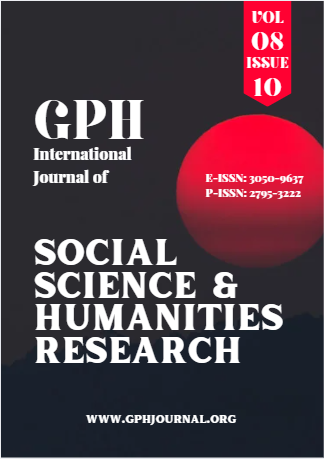RAPPORTS SOCIAUX DE GENRE ET DYNAMIQUES ORGANISATIONNELLES DANS L’ADMINISTRATION PUBLIQUE :
cas du Ministère du Commerce et de l’Industrie (Côte d’Ivoire)
Abstract
This article examines gender relations and organizational dynamics within the Ministry of Commerce and Industry in Côte d’Ivoire, focusing on the gap between public policies promoting gender parity and their actual implementation. Based on a qualitative approach combining semi-structured interviews and document analysis, the study highlights structural, institutional, and sociocultural barriers that limit the integration of gender considerations into administrative practices. The analysis shows that, despite a growing awareness of the importance of equality, inter-institutional coordination and initiatives supporting women remain insufficient. Sustainable institutionalization of gender thus requires improved coordination among stakeholders, strengthening of dedicated structures, continuous staff training, and the integration of gender into planning and evaluation of organizational practices.
Downloads
References
- CALOGIROU Christina, (1991), "Femmes et insertion : Le rôle de l'État et des collectivités territoriales", in : Revue française des affaires sociales, 45(3), pp. 57-71.
- CNPC – Comité National de Pilotage du Compact, (2019), Étude sur les obstacles à la participation économique des femmes et des filles en Côte d’Ivoire, Rapport MCC-Côte d’Ivoire.
- CNP-Genre, (2022), Rapport du Comité National de Politique Genre, République de Côte d’Ivoire.
- CÔTÉ Danielle, (2014a), "La marginalisation des organisations féminines dans la coordination humanitaire post-catastrophe : le cas d’Haïti après le séisme de 2010", in : Recherches féministes, 27(2), pp. 61–84.
- CÔTÉ Danielle, (2014b), "Quand le genre est mis en crise : interventions féministes en Haïti après le séisme", in : Recherches féministes, 27(1), pp. 147–165.
- DELCROIX Catherine, (1996), "Médiations et mobilisations féminines dans les quartiers populaires", in : Cahiers du genre, 20, pp. 113-131.
- FAO, (2022), Normes sociales et sécurité alimentaire : entre perceptions genrées et accès aux ressources. Intervention lors de la Journée internationale des droits des femmes, Rome : FAO.
- KABEER Naila, (1999), "Resources, Agency, Achievements: Reflections on the Measurement of Women’s Empowerment", in : Development and Change, 30(3), pp. 435-464. https://doi.org/10.1111/1467-7660.00125
- KERGOAT Danièle, (2000), "Division sexuelle du travail et rapports sociaux de sexe", in : Actuel Marx, 28(2), pp. 85-100.
- MICHELOT Aude, (2012), "L’égalité des sexes et l’autonomisation des femmes dans les instruments internationaux relatifs au développement durable", in : Revue juridique de l’environnement, 37(4), pp. 575-592.
- MICHELOT Aude, (2012), "L’égalité femmes-hommes dans les instruments internationaux du développement durable", in : Revue juridique de l’environnement, 37(4), pp. 555-568.
- OCDE, (2022), SIGI Côte d’Ivoire 2022 – Institutions sociales et égalité femmes-hommes : Rapport national, Paris : Éditions OCDE.
- OCDE, (2023), SIGI 2023 Global Report: Gender Equality in Times of Crisis, Paris : OECD Publishing.
- OKONKWO Chinyere, (2013), "Gender Norms and the Ecological Systems Theory: A Multilevel Perspective on Socialization", in : Journal of Gender Studies, 22(4), pp. 432–446.
- PALIER Bruno, (2007), Gouverner la sécurité sociale : réformes et changements en Europe, Paris : Presses de Sciences Po.
- PETIT Claire, (2024), "La rhétorique constitutionnelle de la participation citoyenne : entre légitimation et neutralisation", in : Politiques et Sociétés, 43(1), pp. 89-112.
- POMEY Marie-Pascale, DENIS Jean-Louis et FOREST Pierre-Gerlier, DURANCEAU Marie-France, (2010), "La gouvernance en réseau et l’intégration des services : vers un nouveau modèle organisationnel en santé", in : Politiques et management public, 27(1), pp. 97-112.
- POMEY Marie-Pascale, MARTIN Éric, FOREST Pierre-Gerlier, LEMIEUX-CHARLES Louise, (2010), "La gouvernance en réseau dans le secteur de la santé : vers un nouveau modèle de gestion des organisations publiques", in : Politiques et management public, 27(1), pp. 1-20.
- ROWLANDS Jo, (1997), Questioning Empowerment: Working with Women in Honduras, Oxford : Oxfam Publishing.
- SIMARD Caroline, (1984), "Femmes et politique : une analyse de l’exclusion structurelle", in : Recherches féministes, 1(1), pp. 7-26.
- SØRENSEN Eva, TORFING Jacob, (2007), Theories of Democratic Network Governance, Cheltenham : Edward Elgar Publishing.
- TIXIER Pierre-Éric, (1986), "La gestion participative ou la manipulation des salariés ?", in : Sociologie du travail, 28(3), pp. 307-322.
- TRAORE Tiamba, COULIBALY Wagnonfèhè, DOTE Chantal, (2025b), "Le rôle de l’éducation traditionnelle à travers le Poro dans la gestion communautaire et la préservation des sanctuaires boisés en milieu urbain : cas de la ville de Korhogo (Côte d’Ivoire)", in : GPH-International Journal of Social Science and Humanities Research, 8(8), pp. 20-32.
- TRAORE Tiamba, DOTE Chantal, KASSY Adou Saint-Blanc, (2025a), "Management des institutions publiques et privées face aux relations sociales, aux normes et aux cultures organisationnelles", in : GPH-International Journal of Business Management, 8(8), pp. 95-103.
- TRIPP Aili Mari, (2015), Women and Power in Post-Conflict Africa, Cambridge : Cambridge University Press.
The authors and co-authors warrant that the article is their original work, does not infringe any copyright, and has not been published elsewhere. By submitting the article to GPH-International Journal of Social Science and Humanities Research, the authors agree that the journal has the right to retract or remove the article in case of proven ethical misconduct.














 Firozpur Jhirka, Haryana, India
Firozpur Jhirka, Haryana, India

